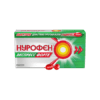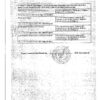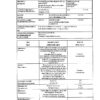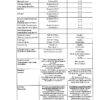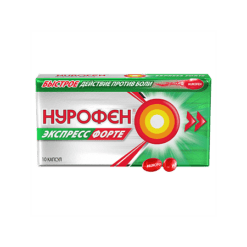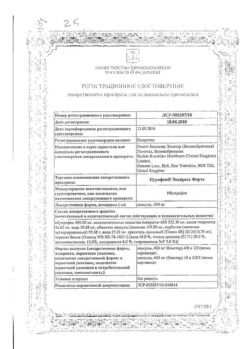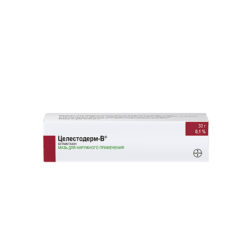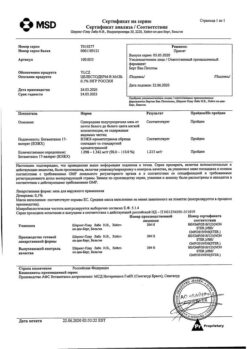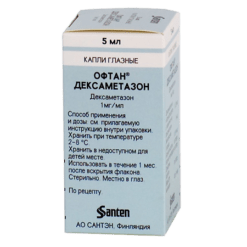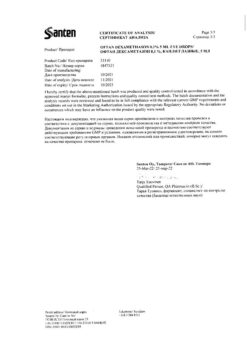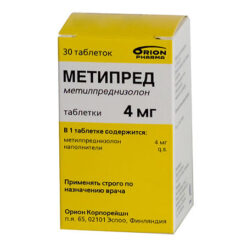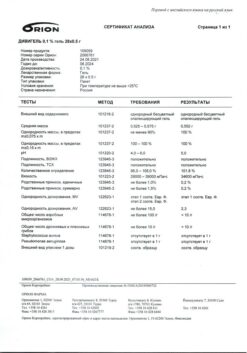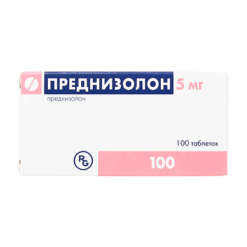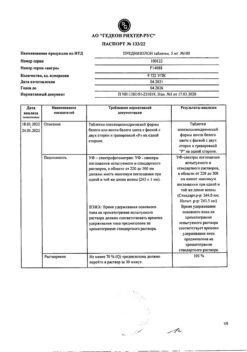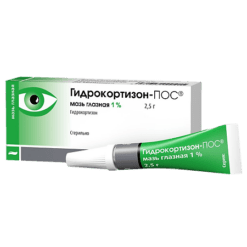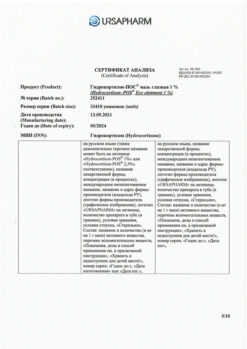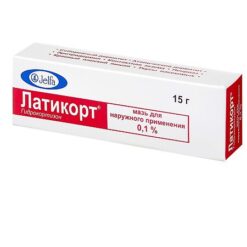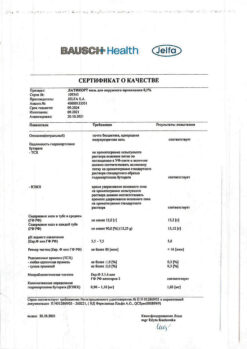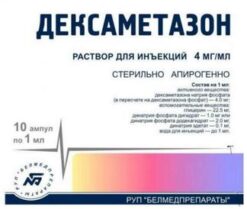No products in the cart.
Nurofen Express Forte, 400 mg capsules 20 pcs
€10.15 €8.88
Description
The mechanism of action of ibuprofen, a propionic acid derivative of the group of non-steroidal anti-inflammatory drugs (NSAIDs), is due to the inhibition of prostaglandin synthesis – mediators of pain, inflammation and hyperthermia. It blocks indiscriminately cyclooxygenase-1 (COX-1) and cyclooxygenase-2 (COX-2) and inhibits the synthesis of prostaglandins.
It has rapid directed action against pain (analgesic), antipyretic and anti-inflammatory effects. In addition, ibuprofen reversibly inhibits platelet aggregation.
Indications
Indications
Nurofen Express Forte is used for headaches, migraines, toothaches, painful menstruation, neuralgia, back pain, muscle and rheumatic pain; for feverish conditions such as influenza and colds.
Pharmacological effect
Pharmacological effect
The mechanism of action of ibuprofen, a derivative of propionic acid from the group of non-steroidal anti-inflammatory drugs (NSAIDs), is due to inhibition of the synthesis of prostaglandins – mediators of pain, inflammation and hyperthermic reaction. Indiscriminately blocks cyclooxygenase-1 (COX-1) and cyclooxygenase-2 (COX-2), as a result of which it inhibits the synthesis of prostaglandins.
It has a rapid, targeted effect against pain (analgesic), antipyretic and anti-inflammatory effects. In addition, ibuprofen reversibly inhibits platelet aggregation.
Special instructions
Special instructions
It is recommended to take the drug for the shortest possible course and in the minimum effective dose necessary to eliminate symptoms. During long-term treatment, monitoring of the peripheral blood picture and the functional state of the liver and kidneys is necessary. When symptoms of gastropathy appear, careful monitoring is indicated, including esophagogastroduodenoscopy, a complete blood count (hemoglobin determination), and a stool test for occult blood. If it is necessary to determine 17-ketosteroids, the drug should be discontinued 48 hours before the study. During the treatment period, ethanol intake is not recommended.
Patients with renal failure should consult a doctor before using the drug, as there is a risk of deterioration in the functional state of the kidneys.
Patients with arterial hypertension, including a history of and/or chronic heart failure, should consult a doctor before using the drug, since the drug may cause fluid retention, increased blood pressure and edema.
Information for women planning pregnancy: the drug inhibits cyclooxygenase and prostaglandin synthesis and may affect ovulation, disrupting female reproductive function (reversible after discontinuation of treatment).
Impact on the ability to drive vehicles and machinery
Patients who experience dizziness, drowsiness, lethargy, or blurred vision while taking ibuprofen should avoid driving or operating machinery.
Active ingredient
Active ingredient
Ibuprofen
Composition
Composition
One capsule contains
active ingredient – ibuprofen 400 mg,
excipients: macrogol-600 335.3 mg, potassium hydroxide 44.82 mg, water 29.88 mg;
capsule shell: gelatin 197 mg, sorbitol (partially dehydrogenated) 95.68 mg, water 25.02 mg, crimson dye [Ponceau 4R] (E124) 0.79 mg, white ink [Opacode WB NS-78-18011] (water 48%, titanium dioxide (E171) 29%, propylene glycol 10%, isopropanol 8%, hypromellose ZsR 5%).
Contraindications
Contraindications
Hypersensitivity to ibuprofen or any of the components included in the drug.
Complete or incomplete combination of bronchial asthma, recurrent nasal polyposis and paranasal sinuses, and intolerance to acetylsalicylic acid or other non-steroidal anti-inflammatory drugs (including a history).
Erosive and ulcerative diseases of the gastrointestinal tract (including gastric and duodenal ulcers, Crohn’s disease, ulcerative colitis) or ulcerative bleeding in the active phase or in history (two or more confirmed episodes of peptic ulcer or ulcerative bleeding).
A history of bleeding or perforation of a gastrointestinal ulcer caused by the use of NSAIDs.
Severe liver failure or active liver disease.
Severe renal failure (creatinine clearance <30 ml/min), confirmed hyperkalemia.
Decompensated heart failure; period after coronary artery bypass surgery.
Cerebrovascular or other bleeding.
Hemophilia and other bleeding disorders (including hypocoagulation), hemorrhagic diathesis.
Fructose intolerance.
Pregnancy (III trimester).
Children's age up to 12 years.
With caution
If you have the conditions listed in this section, you should consult a doctor before using the drug.
Concomitant use of other NSAIDs, a history of a single episode of gastric ulcer or gastrointestinal ulcer bleeding; gastritis, enteritis, colitis, the presence of Helicobacter pylori infection, ulcerative colitis; bronchial asthma or allergic diseases in the acute stage or in history – bronchospasm may develop; systemic lupus erythematosus or mixed connective tissue disease (Sharpe’s syndrome) – increased risk of aseptic meningitis; renal failure, including with dehydration (creatinine clearance 30-60 ml/min), nephrotic syndrome; liver failure, liver cirrhosis with portal hypertension, hyperbilirubinemia, arterial hypertension and/or heart failure, cerebrovascular diseases; blood diseases of unknown etiology (leukopenia and anemia), severe somatic diseases, dyslipidemia/hyperlipidemia, diabetes mellitus, peripheral arterial diseases; smoking; frequent drinking of alcohol; simultaneous use of medications that may increase the risk of ulcers or bleeding, in particular oral glucocorticosteroids (including prednisolone), anticoagulants (including warfarin), antiplatelet agents (including acetylsalicylic acid, clopidogrel), selective serotonin reuptake inhibitors (including citalopram, fluoxetine, paroxetine, sertraline); pregnancy I-II trimester, breastfeeding period, old age.
Side Effects
Side Effects
The risk of side effects can be minimized if the drug is taken in a short course at the minimum effective dose required to eliminate symptoms.
Side effects are predominantly dose dependent.
The following adverse reactions were observed with short-term use of ibuprofen in doses not exceeding 1200 mg/day (3 capsules). When treating chronic conditions and with long-term use, other adverse reactions may occur.
The incidence of adverse reactions was assessed based on the following criteria: very often (≥ 1/10), often (from ≥ 1/100 to < 1/10), infrequently (from ≥ 1/1000 to < 1/100), rarely (from ≥ 1/10,000 to < 1/1000), very rarely (< 1/10,000), frequency unknown (data on no frequency estimates).Blood and lymphatic system disorders
Interaction
Interaction
The simultaneous use of ibuprofen with the following drugs should be avoided:
· Acetylsalicylic acid: with the exception of low doses of acetylsalicylic acid (no more than 75 mg per day) prescribed by a doctor, since combined use may increase the risk of side effects. With simultaneous use, ibuprofen reduces the anti-inflammatory and antiplatelet effect of acetylsalicylic acid (an increase in the incidence of acute coronary insufficiency in patients receiving small doses of acetylsalicylic acid as an antiplatelet agent is possible after starting ibuprofen).
· Other NSAIDs, including selective cyclooxygenase-2 inhibitors: the simultaneous use of two or more drugs from the NSAID group should be avoided due to a possible increased risk of side effects.
Use with caution simultaneously with the following medications:
· Anticoagulants and thrombolytic drugs: NSAIDs may enhance the effect of anticoagulants, in particular warfarin and thrombolytic drugs.
· Antihypertensives (ACE inhibitors and angiotensin II antagonists) and diuretics: NSAIDs may reduce the effectiveness of drugs in these groups. Diuretics may increase the nephrotoxicity of NSAIDs.
· Glucocorticosteroids: increased risk of gastrointestinal ulceration and gastrointestinal bleeding.
· Antiplatelet agents and selective serotonin reuptake inhibitors: increased risk of gastrointestinal bleeding.
· Cardiac glycosides: simultaneous use of NSAIDs and cardiac glycosides can lead to worsening heart failure, a decrease in glomerular filtration rate and an increase in the concentration of cardiac glycosides in the blood plasma.
· Lithium preparations: there is evidence of the likelihood of an increase in the concentration of lithium in the blood plasma during the use of NSAIDs.
· Methotrexate: there is evidence of the likelihood of an increase in the concentration of methotrexate in the blood plasma during the use of NSAIDs.
Cyclosporine: increased risk of nephrotoxicity with concomitant use of NSAIDs and cyclosporine
· Mifepristone: NSAIDs should be started no earlier than 8-12 days after stopping mifepristone, as NSAIDs may reduce the effectiveness of mifepristone.
Tacrolimus: Concomitant use of NSAIDs and tacrolimus may increase the risk of nephrotoxicity.
· Zidovudine: Concomitant use of NSAIDs and zidovudine may result in increased hematotoxicity. There is evidence of an increased risk of hemarthrosis and hematomas in HIV-positive patients with hemophilia who received concomitant treatment with zidovudine and ibuprofen.
· Quinolone antibiotics: In patients receiving concomitant treatment with NSAIDs and quinolone antibiotics, the risk of seizures may be increased.
Overdose
Overdose
In children, overdose symptoms may occur after taking a dose exceeding 400 mg/kg body weight. In adults, the dose-dependent effect of overdose is less pronounced. The half-life of the drug in case of overdose is 1.5-3 hours.
Symptoms: nausea, vomiting, epigastric pain or, less commonly, diarrhea, tinnitus, headache and gastrointestinal bleeding. In more severe cases, manifestations from the central nervous system are observed: drowsiness, rarely – agitation, convulsions, disorientation, coma. In cases of severe poisoning, metabolic acidosis and increased prothrombin time, acute renal failure, liver tissue damage, decreased blood pressure, respiratory depression and cyanosis may develop. In patients with bronchial asthma, exacerbation of this disease is possible.
Treatment: symptomatic, with mandatory maintenance of airway patency, monitoring of ECG and vital signs until the patient’s condition is normalized. Oral use of activated charcoal or gastric lavage is recommended within one hour after taking a potentially toxic dose of ibuprofen.
If ibuprofen has already been absorbed, an alkaline drink may be prescribed in order to eliminate the acidic derivative of ibuprofen by the kidneys, forced diuresis. Frequent or prolonged seizures should be treated with intravenous diazepam or lorazepam. When bronchial asthma worsens, the use of bronchodilators is recommended.
Storage conditions
Storage conditions
Store at a temperature not exceeding 25 °C.
Keep the drug out of the reach of children.
Shelf life
Shelf life
3 years.
Manufacturer
Manufacturer
Patheon Softgels B.V., The Netherlands
Additional information
| Shelf life | 3 years. |
|---|---|
| Conditions of storage | Store at temperatures under 25 ° C. Keep the drug out of the reach of children. |
| Manufacturer | Reckitt Benckiser Healthcare International Ltd, United Kingdom |
| Medication form | capsules |
| Brand | Reckitt Benckiser Healthcare International Ltd |
Other forms…
Related products
Buy Nurofen Express Forte, 400 mg capsules 20 pcs with delivery to USA, UK, Europe and over 120 other countries.





